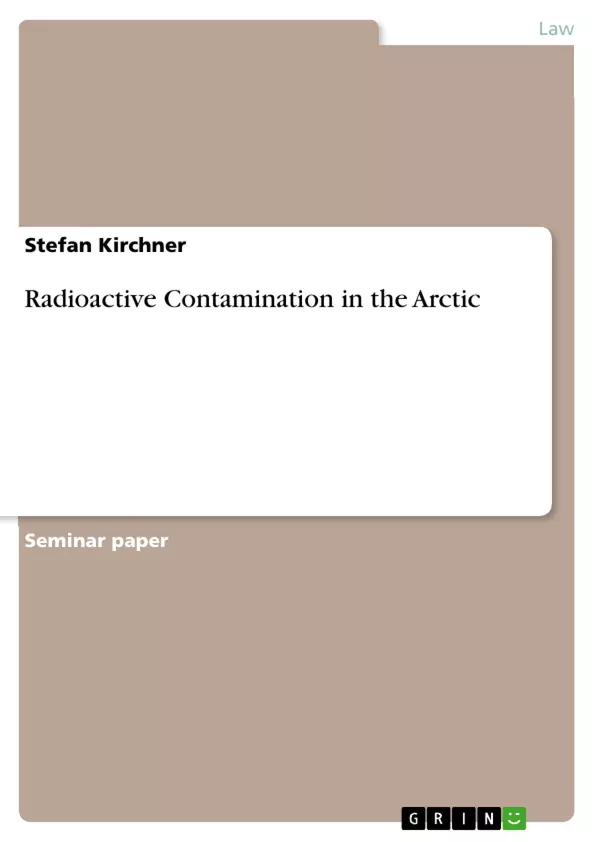Reindeer herding provides an important source of livelihood in many parts of the Arctic. In Northern Europe, reindeer herders are still battling the consequences of nuclear fallout suffered in the wake of the 1986 Chernobyl incident. In 2014 in parts of Norway a rapid increase in radioactivity was reported in reindeer meat as a result of the consumption of specific mushrooms which store large amounts of cesium-137. In this article the question will be asked if reindeer herders can have a claim for compensation under the European Convention on Human Rights.
Inhaltsverzeichnis (Table of Contents)
- Radioactive Contamination in the Arctic
- Economic Losses Caused by the Consumption of Cortinarius Caperatus
- A Problem of Human Rights Law
Zielsetzung und Themenschwerpunkte (Objectives and Key Themes)
This article explores the economic losses suffered by reindeer herders due to radioactive contamination of reindeer meat, focusing on the role of the mushroom Cortinarius caperatus in the contamination. The article argues that these economic losses constitute a violation of human rights law, particularly the right to property, which is protected by the European Convention on Human Rights.
- Radioactive Contamination of Reindeer Meat
- Economic Losses for Reindeer Herders
- Human Rights Implications of Radioactive Contamination
- Traditional Food Sources and Environmental Pollution
- Reindeer Herding and the Right to Property
Zusammenfassung der Kapitel (Chapter Summaries)
The article begins by highlighting the importance of reindeer herding as a livelihood for indigenous groups in the global north. It then details the recent spike in cesium-137 levels in reindeer meat in parts of Norway, tracing this contamination back to the Chernobyl nuclear accident in 1986. The contamination is linked to the consumption of Cortinarius caperatus mushrooms by reindeer, which absorb and store cesium-137, as well as other pollutants, potentially posing a risk to human health. The article further emphasizes the need for greater research into the impact of pollution on traditional food sources.
The article examines the economic implications of the radioactive contamination for reindeer herders, highlighting potential losses in income due to reduced demand for contaminated meat and disruptions to traditional slaughtering practices. The article also considers the long-term consequences of delayed slaughtering, including potential impacts on the overall herd due to reduced food availability and increased risk of malnourishment. The article concludes by examining the legal framework of human rights and its applicability to the situation of reindeer herders, arguing that the economic losses caused by the contamination may violate the right to property under the European Convention on Human Rights.
Schlüsselwörter (Keywords)
The article focuses on the following key themes: radioactive contamination, reindeer herding, human rights, property rights, economic losses, traditional food sources, environmental pollution, cesium-137, Cortinarius caperatus, European Convention on Human Rights, Chernobyl, indigenous communities.
Frequently Asked Questions
How did Chernobyl affect the Arctic?
Radioactive fallout from the 1986 disaster contaminated the Arctic environment, leading to long-term accumulation of cesium-137 in the food chain.
Why is reindeer meat still radioactive?
Reindeer consume specific mushrooms (like Cortinarius caperatus) and lichens that store large amounts of cesium-137 from the soil.
What economic losses do reindeer herders face?
Contamination leads to reduced demand for meat, disruptions in traditional slaughtering, and loss of income for indigenous communities.
Can herders claim compensation under human rights law?
The article argues that economic losses caused by contamination may violate the right to property under the European Convention on Human Rights.
What is the role of the Cortinarius caperatus mushroom?
This mushroom acts as a bio-accumulator, absorbing high levels of radioactive cesium, which is then ingested by reindeer during the grazing season.
- Quote paper
- Dr. Stefan Kirchner (Author), 2015, Radioactive Contamination in the Arctic, Munich, GRIN Verlag, https://www.grin.com/document/301166



